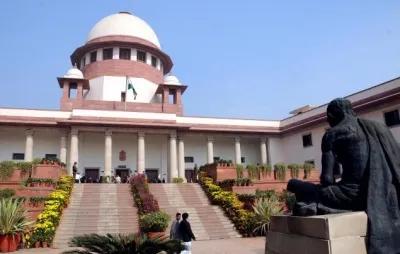New Delhi: Senior advocate Gopal Sankaranarayanan on Wednesday contended before the Constitution Bench of the Supreme Court that during the President's rule, only "functions" of the government may be carried by the President and not its "powers".
A "function" under such President's rule is day-to-day activity of the governance, he added.
He said that when a proclamation under Article 356 is in effect, irrevocable changes cannot be made.
"What is provided under Article 370 is not a 'function' but a 'power'. Their (President) proclamation under Article 356 is in the same terms. It says 'functions'. So, the only thing that could have taken over was 'functions' not 'power'," Sankarnarayanan told the Constitution Bench.
He said: "By using powers under Article 356, can you do things which are irreversible and destructive? The idea of Article 356, much like Article 123 (President's power to promulgate ordinance), is a stopgap, so that eventually Parliament or the government will take a call. It's not that you can do something completely irreversible."
On bifurcation of Jammu & Kashmir into two Union Territories, Sankarnarayanan said that a state has never been downgraded into UTs.
"Twelve Reorganization Acts show that a state has never been annulled. All that has happened is Union Territories have moved into the state. You never had a situation where converse had happened," he said.
He illustrated that suppose an original suit under Article 131 is instituted by a state against the Union of India and asked the court to consider if it will be permissible for the Union of India to impose President's Rule and withdraw the suit originally instituted by the state government.
Sankarnarayanan argued that in interpreting Article 370, much attention should not be paid to the marginal note as there are many provisions across the Constitution, outside of Part XXI, which are also temporary in nature.
He said that in nullifying Article 370, Article 367 - which lays down the rules for the interpretation of the Constitution - has been misused to read "constituent assembly" as "legislative assembly".
"For example, the word 'person' in Article 21 can be interpreted to mean 'person accused of an offence'. In (Article) 367, I will put an interpretation clause and say person means person accused of an offence. So all other rights under (Article) 21 are out of the window," he illustrated.
He said such interpretation may be misused tomorrow to read the term "the legislature of not less than 1/2 of the state" in Article 368 as 'Rajya Sabha' or 'law minister'.
Earlier in the day, Solicitor General Tushar Mehta submitted before the Constitution Bench that the Union government has absolutely no intention to interfere with the special provisions of the Constitution applicable to the northeastern states or any other part of the country.
Sankaranarayanan concluded oral arguments on behalf of the petitioners in the matter.
Attorney General R. Venkataramani, Solicitor General Tushar Mehta, Senior advocates Harish Salve, Mahesh Jethmalani and Rakesh Dwivedi, Additional Solicitor General KM Natraj, etc., will present oral arguments from tomorrow on behalf of the Centre. —IANS

